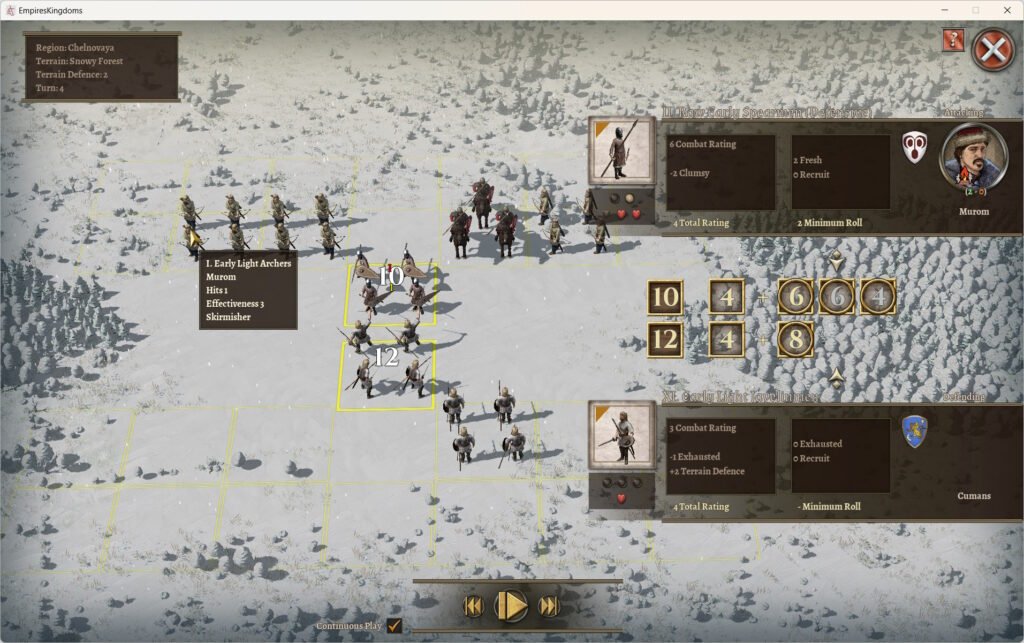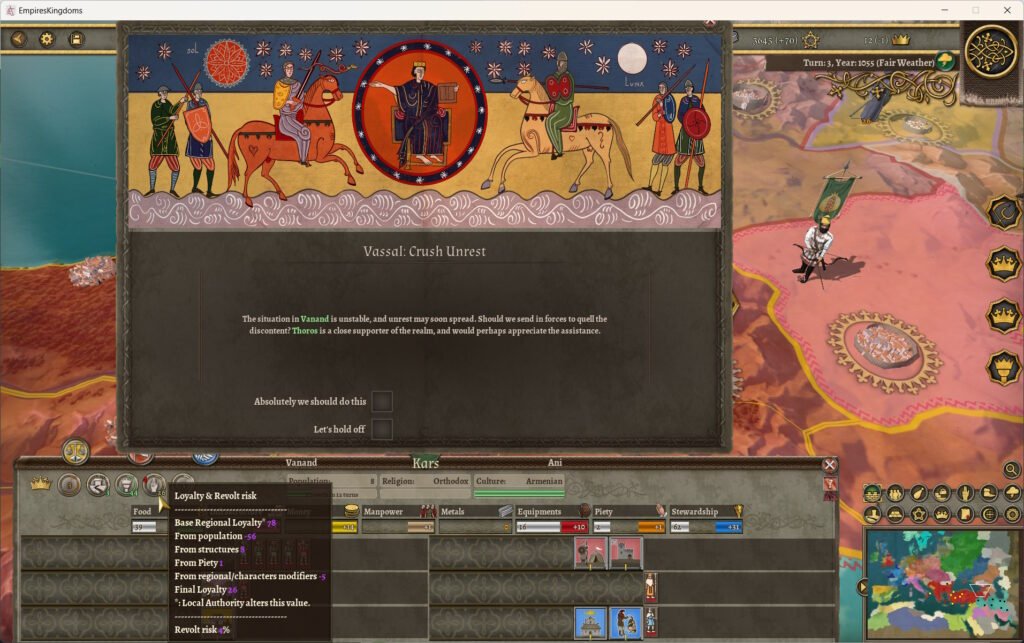Field of Glory: Kingdoms is a historical strategy game where you preside over the development of a nation in Europe or the Middle East over two centuries. You will have to master all facets of power, from the economy to the armies, including dynastic quarrels.
We were really excited to make a game set in the Middle Ages. It’s a fascinating period because of its great diversity and extreme turbulence. No power can be sure of staying on top. It’s also the era of the first religious wars and thus of multinational conflicts covering dozens of countries at once.
This multitude of historical conflicts means that warfare is an important part of the game. Indeed, the campaign and battle rules are detailed enough to rival a true wargame. Logistics are taken into account, as well as the suitability of units to terrain, the quality of generals, and many other concepts for the armchair general.

But this warfare and conquest isn’t going to be easy. If you manage to conquer a quarter of the map, you’re already an excellent player. Unlike other ‘paint the map’ games, Kingdoms makes you feel that expanding is difficult and a constant challenge.
And the game isn’t just about warfare. We’re really pleased with the economic development system, which allows you to have real and varied choices even in peacetime, breaking away from the beaten path of other games where you reproduce the same economic development pattern every time. It is constantly renewed and relies on a huge base of more than 600 buildings.
Dynastic mechanics are also very important. From an immediate perspective, having an unstable dynasty will more often lead to coups and rebellions, which will necessarily weaken the kingdom (the game emphasizes the notion of the King’s Authority). But almost all mechanisms in Kingdoms interact with each other, and having dynastic problems also impacts the progression towards improved forms of kingdoms and your chances of winning the game through legacy points.

Although there are some similarities with our previous game Field of Glory: Empires,all of the systems in Kingdoms are addressed in much more in-depth. For example, Empires only had generals, but now we have characters who can also be governors, or a concubine, the queen, a daughter to be married off. And there are a lot of brand new systems, such as religions and castle construction.
Beyond the core campaign there are plenty of scenarios which allow the player to explore specific areas and periods of the Middle Ages. The scenarios take place on fractions of the main map, and each has different victory conditions. The nations have completely asymmetrical positions and unique challenges. For example, the Byzantines at Manzikert have an army in a pitiful state at the beginning, while Philip Augustus in the “fall of the Angevin Empire” scenario will have to call on his vassals to fight against the evil English.
Although we’re very happy with the game as it stands, we’d really like to explore some areas in more detail. This will mainly depend on the public reception, but you can always look at the content of the companion game, Field of Glory II: Medieval, to get an idea of possible periods and places to discover!
In the meantime, there are plenty of interesting and exciting factions to try out. For a first game, you might want to try Scotland or the Fatimids, as these nations are generally not too troubled initially (although the Fatimids will face the Crusades). Later, a maritime Italian republic like Genoa or Venice, or a Rus’ principality that will have to prepare for the inevitable arrival of the powerful Mongols could be interesting. We hope you enjoy our game – let us know what you think!
Thank you for the presentation. The game looks stunning – particularly the ‘strategy’ mode.
You mentioned your wish to deviate from the “paint the map” formula of other grand strategy games. Were there any particular challenges you faced in confronting established genre conventions? How did you balance the wish to do something different with meeting players’ expectations?
It has indeed been difficult because, although in theory, players say they don’t want a map painter, in practice, if you prevent them from doing so, they are unhappy (not all, but most). So, we had to walk a fine line between limitation and possibility, through numerous mechanisms that reduce Authority.
It appears to be a great project, I can’t wait to try it as soon as possible. How does Field of Glory: Kingdoms integrate the complexity of dynastic mechanics with the economic and military systems to simulate the multifaceted challenges of ruling a medieval nation, and what does this integration reveal about the interconnected nature of political stability, economic development, and military strategy during the Middle Ages?”
Indeed, we focused on the connection between different concepts. Thus, your national authority helps stabilize loyalty in your regions, but the further you are from the capital, the less it will affect. This is where the authority of local nobles, via stewardship, comes into play. The clergy will also play a role, but having too powerful a nobility or clergy can be a problem. Additionally, your nation’s economy operates at the local level, but if you are not satisfied, the king can issue an edict to intervene directly, but this will come at a cost. Everything is interconnected in Kingdoms!
Thank you so much for introducing the game! As someone interested in sound design, I was wondering if you could give us any insights on the sound design strategies for the game and how they relate to our understanding of the Middle Ages? Thanks!
Seconded! Great question.
We used dozens of sounds for buildings, which can trigger when you inspect a region and thus link what you own with what you hear. Scanning your region panel and hearing a bell when you have a church or the clucking of hens when you have poultry is quite immersive. Additionally, we have placed triggers on regions, their terrains, and the current weather to generate appropriate sounds. For example, the rustling of leaves if your mouse is over a forest or the sound of seagulls if you are near a coast.
Thanks for this! I wondered if you could say a bit more about how you deal with diplomacy and inter-monarch relations? One of the complexities of medieval history is that of course these polities often weren’t unitary, sovereign states in the way people after the 17th century imagined them, and could have quite complex agreed relationships, tributes, acknowledgements of nominal suzerainty, obligations around military matters, and so on. I’m a historian of Georgia and Armenia primarily and of course that’s a particularly important feature in that region where there’s a lot of difficult balancing acts rather than many hard lines amid such a complex religious & cultural patchwork. Keen to know what your thoughts are on that and whether that’s something you tried to capture in the game 🙂
To be brief, a monarch is never actually obliged to keep their word! Even in an alliance, they might not follow you. In the worst-case scenario, there are decisions that allow for a devastating sneak attack. Things are therefore diffuse, and there are opportunities to act against a kingdom covertly by, for example, undermining the loyalty of the members of your neighbor’s court.
Thank you very much for the presentation!
You mentioned religions as part of the game’s new features. What religions do you have in the game? Do you treat western and eastern as different, and sometimes conflicting forms?
We have the two main beliefs of Christianity, Catholicism and Orthodoxy, as well as the two main beliefs of Islam (Sunni and Shiite). Additionally, we have the Jewish religion, the Miaphysite, pagans, and various heretical movements. All this creates what we call fault lines, which will lead the game to behave historically, with the tensions we know.
[…] •15:00: More than a Wargame: Introducing Field of Glory: Kingdoms […]